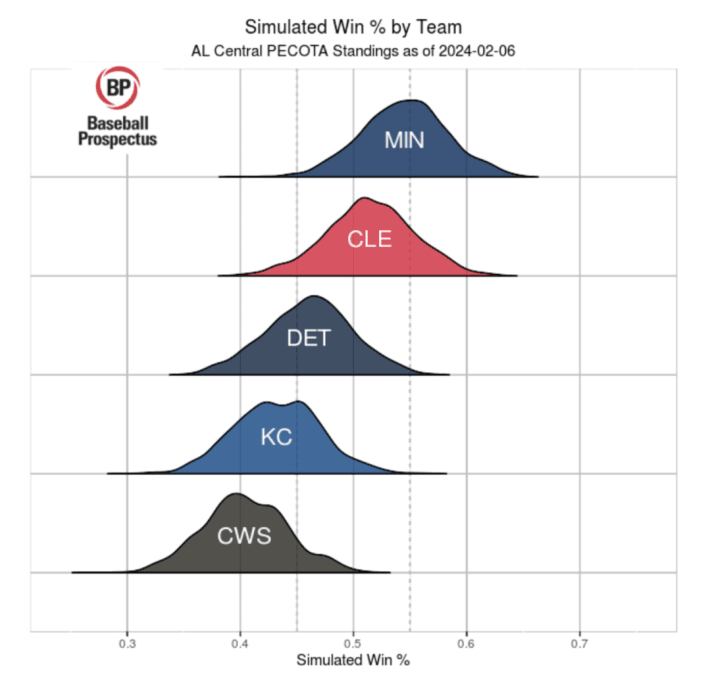The PECOTA projections are out, and the White Sox -- and the AL Central as a whole -- are spared its wrath.
The standings are still gross, mind you, but it wouldn't have surprised me if the division only had one winning team, with a White Sox team stuck with triple-digit losses. Both things happened last year, and the division has mostly spent the winter walking in place.
The inherently conservative nature of projections helps the AL Central here, because PECOTA doesn't see things being quite that bad again.
| Standings | W-L | Div% | WC% |
|---|---|---|---|
| Minnesota | 88-74 | 67.9 | 8.2 |
| Cleveland | 83-79 | 28.8 | 13.0 |
| Detroit | 75-87 | 2.8 | 2.8 |
| Kansas City | 70-92 | 0.5 | 0.4 |
| Chicago | 65-97 | 0.0 | 0.0 |
On its face, that's neither respectable nor catastrophic -- mostly because, for the White Sox, the catastrophe already happened, which means any improvement comes as a slight relief.
But then you look at the distribution of outcomes that accompanies the PECOTA standings, and the White Sox are not out of the woods yet.

The White Sox have some issues with their mechanics here, because you don't want to see the back shoulder riding higher than the front. The White Sox are relatively fine if they cash their mean or median projections -- and I'd love to see the sliver of outcomes that gets them over .500 -- but the mode represents zero progress.
Aside from Erick Fedde and Saturday's trades for Dominic Fletcher and Zach DeLoach, most of Chris Getz's moves have eschewed upside for defensive competence, and the sum of those parts is represented by the steep drop-off of potential outcomes before a .450 winning percentage.
The downside of that bet is represented by the win curve's junk in the trunk. If that pursuit of low-ceiling certainty doesn't materialize, and the White Sox's largely unsettled bullpen struggles to hold whatever late-inning leads the offense can muster, that's how you get 110 losses or worse.
A 65-97 record falls short of disaster when accounting for the manifold paths to ruin. As we've seen Chris Getz's strategy (and Jerry Reinsdorf's imposed restrictions) unfold, a multi-year project lay ahead. If you use the White Sox's last rebuild as a template, this projection puts them where they were in 2017 (67-95). A successful 2024 won't be reflected in this year's record, but it'll feel like a little bit of a win if they finish the year in position to skip ahead to 2019, when they still lost 89 games, but in a promising way. Avoiding another 2018 is the goal, because one of those in 2025 would be their third 2018 in seven years.





